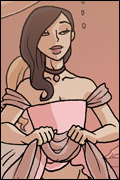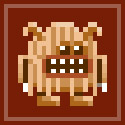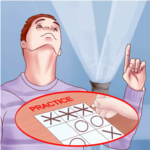|
quote:This is neat, but the problem is thematically I'm not sure how visibly different animals meshes with secret objectives. Yeah, kind of awkward. I think if you had public animal identities, you'd want to simplify the objectives. I'd think maybe 2 general alignments, but then a couple floater objectives - like: guys with hidden red cards want to exterminate the humans, green cards want to make peace - but then this other guy wins as long as it makes it to the last round or something. And the various animal powers/rules/whatever mean that you have good reason to (at least often) profess a different alignment than you have. If nothing else, having general alignments makes balancing less brutal; getting a lot of different objectives generally balanced could be brutal. In a game like Resistance everyone is normally going to claim they're Blue all the time. I think it'd be awesome if people were constantly claiming different alignments at different times (or, at very least, there wasn't a default "good" alignment - making it a hidden team game instead of a "traitor" game). But that means you need more complexity in the public part of the game, so that different public roles perform different functions over time, so that there's good reason to lie but not always, and so that there's enough swings to shake people out of ruts. Maybe you could have themed decision cards - like "should we steal their food while they're gone" or something; and maybe Snake is extra good at that or something. Another idea: maybe instead of alignments, each character gets a secret ally (ie. I'm badger, and my secret ally is crocodile - I win if either I win or crocodile wins; but he doesn't necessarily win when I do, because he has his own secret ally). There's some awkwardness here.. like if you get your own card, maybe that just triggers a redeal - but maybe it could work? This way you have a public objective (your own), but also another secret objective to keep things spicy and reward you for deception. Or, skip all that, and you make your animal identities the secret, tied to your objective (ie. snake's goal is to do x snakey kind of thing, people might guess you're the snake but you want to keep that hidden). But then you lose out on public animal identities, which I think are super fun, and could drive other fun design stuff (eg. Owl sucks at getting stuff done, but can look at a card one round or something). Also, you should make the game take 20 minutes, play with 5 to 12, and be super easy to teach to new groups. Also: maybe some people get public objectives? Like Monkey is always "peace" and Tiger is always "fight", but everyone else gets hidden alignments/objectives? And somebody's objective is just chaos - like when people don't agree on things, something goes on the bone pile, and Hyena wins if the bone pile is big enough by the end. jmzero fucked around with this message at 01:59 on Jan 7, 2014 |
|
|
|

|
| # ? May 14, 2024 23:27 |
|
xopods posted:It's hilarious conceptually but I don't know how you'd make it work as a game, since the players know the rules to the game they're playing. If it's one guy against everyone else it can work in a traitor type game - informed minority vs. uninformed majority - but you can't really do the reverse, since if you're the only dude who doesn't know who the gorilla is, it's obviously you, and therefore everyone else is human. Erm, that's what I should have said. Gorilla knows the others aren't really gorillas, but the humans are all like "these gorilla costumes are flawless" and want to study the gorilla except once the humans arrive they have no way of identifying which one of them isn't human. So the human players are all doing things like going to the mating grounds and trying to tranquilize each other because everybody's in a gorilla suit, meanwhile the actual gorilla is beating people to death. The only problem I have with this premise is that it likely involves the bad kind of player elimination, short of giving the gorilla an absolute victory condition like "take all the guns."
|
|
|
|
I like this guy's solution, on the last page:PlaneGuy posted:Maybe the gorilla is sick of the jungle and wants a nice house and a wife and a 9-to-5 job and cable loving tv. His goal is to be voted human in the end so he gets on the plane with the rest of the scientists when they leave. BUT you can't be too human or the humans will know you're not trying to be a gorilla, which is what the humans are trying to do. The goal wouldn't be to kill all the humans, it'd be to go home and live like a human, leaving one of the scientists behind in the jungle. Gorilla wins if that happens, humans win if they return home without any real gorillas. The suits are so flawless that this is a serious possibility.
|
|
|
|
Yeah, hell yeah, I'd play that game.
|
|
|
|
Broken Loose posted:Erm, that's what I should have said. Gorilla knows the others aren't really gorillas, but the humans are all like "these gorilla costumes are flawless" and want to study the gorilla except once the humans arrive they have no way of identifying which one of them isn't human. If you have archives, you should read my Neanderthals on a Train mafia game. What you're describing is quite similar to the plot (except that the Neanderthals were the majority and the scientists did know who each other were). Also, it was the best Mafia game of all time. 
|
|
|
|
Link? I love reading old mafia games. At least, the good ones.
|
|
|
|
|
jmzero posted:I think if you had public animal identities, you'd want to simplify the objectives. I'd think maybe 2 general alignments, but then a couple floater objectives - like: guys with hidden red cards want to exterminate the humans, green cards want to make peace - but then this other guy wins as long as it makes it to the last round or something. And the various animal powers/rules/whatever mean that you have good reason to (at least often) profess a different alignment than you have. If nothing else, having general alignments makes balancing less brutal; getting a lot of different objectives generally balanced could be brutal. My plan was to have 2-3 sets of qualitatively similar objectives. Like, if the game has tracks to monitor the state of Defence, Economy, Science, Industry, etc., then many of the objectives would be "Make [whatever] as high/low as possible by the end of the game." Others would be "hoard as much of resource X as possible." So some people are trying to prioritize one thing over all else, others are sneakily trying to make sure one thing tanks, and others are trying to get allocated more resources than they actually need. quote:In a game like Resistance everyone is normally going to claim they're Blue all the time. I think it'd be awesome if people were constantly claiming different alignments at different times (or, at very least, there wasn't a default "good" alignment - making it a hidden team game instead of a "traitor" game). But that means you need more complexity in the public part of the game, so that different public roles perform different functions over time, so that there's good reason to lie but not always, and so that there's enough swings to shake people out of ruts. Maybe you could have themed decision cards - like "should we steal their food while they're gone" or something; and maybe Snake is extra good at that or something. Yes, this was kind of the intent. Like, maybe Industry is dangerously low... if you want to get made the Minister of Industry that turn, you're likely to claim that your secret objective is to maximize Industry. But maybe you actually want to keep it low and are going to look at the crises facing it and claim to everyone that you need lots of yellow resources to fix it because you know that there just aren't many yellow resources. So you can keep it low and pretend like there was just nothing you could do. Or maybe you say it needs blue resources, and it does, but you claim a number that the Treasurer can't allocate you exactly, so he has to give you extra and you keep them, and you set it up that way because your objective is to hoard blue resources. But anyway, even if you were telling the truth, then later when Industry is safe again, you're going to claim that you lied because no one's ever going to assign you to it again once the danger is averted, unless they believe it's not really your objective to maximize it. quote:Another idea: maybe instead of alignments, each character gets a secret ally (ie. I'm badger, and my secret ally is crocodile - I win if either I win or crocodile wins; but he doesn't necessarily win when I do, because he has his own secret ally). There's some awkwardness here.. like if you get your own card, maybe that just triggers a redeal - but maybe it could work? This way you have a public objective (your own), but also another secret objective to keep things spicy and reward you for deception. This is quite sweet and something I'll think about. Probably for elegance what should happen is that you have a special kind of objective if you draw yourself as your secret ally. Like, maybe that's how you get traitor alignment. So you don't even know if there's a straight up traitor in any given game. Except then once in a blue moon you'd end up with everyone being a traitor, which would be hilarious but maybe not exactly a great game. So maybe not a traitor in the traditional sense, but still a more self-interested win condition, and one that's a bit easier to achieve than the general win condition, to compensate for the fact that you can't win with someone else. quote:Also: maybe some people get public objectives? Like Monkey is always "peace" and Tiger is always "fight", but everyone else gets hidden alignments/objectives? And somebody's objective is just chaos - like when people don't agree on things, something goes on the bone pile, and Hyena wins if the bone pile is big enough by the end. This was also part of the idea. Everyone has one public objective and one secret and you total the scores between them to see who wins at the end. Generally speaking, the public objectives would be something positive for the group, so to some extent people want to help you do it, just not too much, while the secret objectives would often involve undermining something.
|
|
|
|
silvergoose posted:Link? I love reading old mafia games. At least, the good ones. This should be it. I don't have archives myself though so I can't tell for sure. Let me know if it isn't. http://forums.somethingawful.com/showthread.php?threadid=3375857 EDIT: A little bit of not-terribly-important context... this was the second game I ever modded and was inspired by someone's quip in another game I was playing. That one was Murder on the Orient Express, and someone got frustrated with people being dumb and said something about "This game should be called Neanderthals on a Train." To which I said "I'm totally running that game," and I did. I subsequently ran two other Neanderthals games: Neanderthals at the Louvre, and Neanderthals on Trial. xopods fucked around with this message at 16:50 on Jan 7, 2014 |
|
|
|
Yup, is correct. I used to read lots of mafia games, stopped when there got to be way too many at all times.
|
|
|
|
|
xopods posted:Can anyone think of some super-sweet theme for this other than just running a country, which could give me inspiration for the mechanical details? Or just some feature that they'd really like to see in such a game? Or just general feedback on the concept? I feel like it's something that could be really amazing, but at the moment it's still just a blob of goo waiting for a catalyst to help it crystalize. I've been working on tight, minimalist little games so long that figuring out where to even start on something bigger is intimidating me. Hippie commune, or a religious cult. Some group with a general shared goal like "world peace" but who don't really share a thinking process.
|
|
|
|
modig posted:Hippie commune, or a religious cult. Some group with a general shared goal like "world peace" but who don't really share a thinking process. I think I've got it. Religious cult + animals is the combination that did it. Wise Men of Karaya I'll set it in Karaya so it can tie in with Sultans and feed off that success. I'll invent a fictitious religion for the Karayans. It'll combine the animal spirits aspect of Native American myth with the Vodoun idea of divine possession. So you vote for your High Priest each turn, and then he assigns everyone their spirit animal for the turn, which gives them a special power and also their public objective for the turn... something that's good for the group if they accomplish it and also scores them points. Meanwhile everyone has a secret objective which is consistent throughout the game and scores them points at the end, assuming the "good guys" win. One person is an Unbeliever and doesn't actually care about his score; he simply wins if he causes the group to lose, but has to pretend to be doing his best to carry out his public objectives, lest he be found out. In case the Unbeliever is figured out or just decides to start obstructing things openly instead of playing along, the High Priest can at any point call for the excommunication of whoever has the lowest score, i.e. whoever is doing the worst job of fulfilling his or her assignments. If the vote passes, the person's resources are redistributed among the remaining players and they lose their vote, but will continue to participate in the game some lessened way, maybe by having an influence on what challenges the group has to face. Their secret objective card is NOT revealed, so you'll never know if you Excommunicated the right guy... however, even if they were formerly a good guy, anyone Excommunicated now wants the group to lose, and shares the Unbeliever's win condition. This all seems pretty cool to me. Now I just have to figure out what the group is actually trying to do and how they do it. 
|
|
|
|
Hey, everyone! I'm participating in the card game design contest this month, and my game could use some help. My game is called Magnum Opus, and you can check out the rules here: https://docs.google.com/document/d/1QoMH-QfVfqHNw6pqcPkVJPbKlcCKXDsarAVuCmjhuiM/edit It's to the point where I could probably start playtesting and jiggling the rules, but I have no idea how to do that. I tried playtesting it by myself, but it'd be preferable to have some other brains helping me. I'm also worried that I'm making it way too complex, but of course I can't judge that objectively, since I made the rules and know how they work intimately. Unfortunately, my family knows better than to help me with it, since the last times I've invented card games, they were garbage. Can I enlist your help, even if it's just looking at the rules and seeing where it's too confusing/gamebreaking/complex/whatever? Do you have any suggestions for where the game should go? EDIT: There you go. Now it looks like a real ruleset instead of an outline. ActingPower fucked around with this message at 07:33 on Jan 8, 2014 |
|
|
|
Your rules aren't really written for other people's eyes at the moment. They're more like designer's notes. At the very least, start off with an explanation of what the players are trying to do thematically and then what that translates to mechanically.
|
|
|
|
gnome7 posted:I like this guy's solution, on the last page: You could call it Gorillas in our Midst.
|
|
|
|
ActingPower posted:EDIT: There you go. Now it looks like a real ruleset instead of an outline. Seems like it might be fun with some work, but I see a few main problems currently: (1) The connection between the cards required for a Work and its function is so tenuous that it will take a lot of plays before people can play without referring to the crib sheet constantly. Referring to the crib to see what you can build/what you need to collect is fine, but the bigger problem is that in looking at other people's Works, it's not going to be easy to tell at a glance what your opponents can do. (2) Aside from simply trying to collect high-numbered cards, I don't see that there's going to be a huge amount of strategy to the game. There are very few combinations of four cards you could hold that would fail to get you at least a simple work. In fact, I can list them: EEWA, WWFA, AAFE and FFEW. That's it. Any other four cards give you something. I would suggest additional restrictions on works... like maybe you can only score points for Ideal Works, which consist of paired and/or connected numbers, e.g. 7789, 4443 and 4567 are all Ideal, but 3588 is not. You could still allow people to build non-Ideal works to use their powers (and later either Dissolve them for cards or try to Swap cards out to make them Ideal), but only score VPs for the Ideal ones. (3) You've probably got more options on a player's turn than you really need. Trading a card with an opponent is maybe sometimes useful but the difference in value between doing that and just drawing a card is usually going to be very thin. Maybe you likewise don't need both Swap and Dissolve. More choices doesn't always mean more complexity, sometimes it just means more AP and more distraction. (4) It's going to be tough to balance all those different powers, especially as some of them get radically more powerful as you get a higher Low, while others don't really matter as much and still others actually diminish in value past a certain point... e.g. Sabotage is probably at peak effectiveness around like 3-4; if you make too good a Sabotage work, it becomes hard to use because you may have to Flip your own Works or Unflip your Opponents'. (5) I assume you want The Great Work to be the hardest to build, but AEFW is over 4x easier to acquire than either FFWW or AAEE if you look at the math. I would recommend instead that you have four Great Works that are AAAA, EEEE, FFFF and WWWW. Getting four the same is much harder than one of each. xopods fucked around with this message at 17:06 on Jan 8, 2014 |
|
|
|
Lots of good points. Thanks for writing it up (although it hurt like heck to read).xopods posted:(1) xopods posted:(2) xopods posted:(3)  xopods posted:(4)  xopods posted:(5)
|
|
|
|
ActingPower posted:Blarg. A set of one of each type of card was originally my main idea, and I'm loath to change it. But in my one little playtest, I did notice that it is really easy to make. Perhaps I could double it to WWFFEEAA, meaning you really have to work at it to get it? I did want to do something with having four of the same suit, since there's really nothing you can do with that at this point. I'll think about it, at least. What if you had intermediate works? Like, you have an FFF, a WWW, an AAA and an EEE, and then when you've made all four you can form the Great Work out of them. Overall this seems like a game that's going to have relatively small hand sizes, so I'm not sure that sticking in one work that takes eight cards is going to work well.
|
|
|
|
Here's a really rough idea for a game that I had after playing a few hidden information / traitor games: A traitor mechanic game (like Mafia) using Jenga as the game space. Basically each block is numbered, there's one puller each round, and everyone votes on which block the puller has to pull. If the tower falls over 3 times (or whatever) the traitor(s) win, if the tower goes X rounds without toppling then the non-traitors win. People are voted off every turn. Maybe include some sort of mechanic for voted off players to still interact with the game. I think you could also do fun stuff by writing different events / effects on the blocks themselves (sort of like drinking Jenga, if anyone's ever played a home version of that).
|
|
|
|
I'm digging the idea of a dexterity traitor game but I don't know if Jenga is the right game to base it off of, because in Jenga you have to reset the game state and thus the difficulty every time the tower falls. How about something with more of a theme and a variety of different dexterity games? For instance: You're all crew on a space station facing various dangers, which correspond to various minigames you're going to play with a versatile set of wooden pieces (different shaped blocks, balls, sticks, etc.). Everyone starts with three Danger Level cards in their hand, numbered 1-3, which they can't show to anyone else. Each round, you flip over a Situation card which gives you the type of game someone will have to play - e.g. Core Breach! Next, you vote on which crew member will take on the situation. Then everyone plays a Danger Level card and draws to replace it. The traitors obviously want to play high-numbered cards and the non-traitors want to play low, but of course you're restricted to what you have in your hand, and if you play all your low numbers now, you'll be stuck with only high ones later unless you get lucky with your draws. Meanwhile, traitors don't want to go high all the time, lest they be identified. You add up the Danger Level cards to find the actual total Danger Level, then consult the rulebook for how to set up the minigame in question for that danger level - this might mean having to use more blocks, or having a lower time limit to complete the challenge, or a harder initial configuration, or what have you. For Core Breach, maybe the game is that you construct a little cage out of blocks according to a diagram in the book and then have to remove a cylinder from the center of the structure using a pair of sticks, without knocking anything else over, within a time limit that depends on the danger level. If you succeed, you (and you alone) draw an extra Danger Level card and expand your hand size. If you fail, then the station is damaged. Everyone has to discard one card and is now playing with only two Danger Level cards instead of three. Furthermore, it's now time to place the blame: the group votes on someone to chuck out the airlock and eliminate from the game. After three failures (everyone down to zero cards) the station is destroyed and the traitors win. If you survive a certain number of challenges, then the heroes win. The traitors also win if enough good guys get airlocked that they can control the vote, since they can then nominate their own guys after that and deliberately fail the challenges.
|
|
|
|
Dang, I'd play that. A traitor dexterity game does sound interesting.
|
|
|
|
xopods posted:I'm digging the idea of a dexterity traitor game but I don't know if Jenga is the right game to base it off of, because in Jenga you have to reset the game state and thus the difficulty every time the tower falls. I like that idea about the thread level cards, although Jenga has the benefit of being a known entity for all players, and you can also adjust difficulty by changing the tower height.
|
|
|
|
Hmm. Co-op Mouse Trap, With Traitor. possibly, In Space.
|
|
|
|
Hey all you war gaming dudes out there, I've made a semi light skirmish game and I'm looking for play testers. I've done a few playtests on a personal scale and am in the process of rooting out the problems I encountered during those tests. I'm here now to rouse some interest to get a few more people to put their hands on a game to tell me what they think. Got a wargame with several units, a basic grunt type with crap stats and ability, then special units such as a sniper/gunner/captain that each get a special diggity doo when they do something. Gunner can suppress units, Commander commands units, you name it. You play using action cards not entirely separated from games like Memoir 44', except you have a lot more control over how the cards shake out. At the start of the game you form your 'stack' of standing orders, which is a set of 3 orders face up, none of which can be from the same category (Offense/Red,Defense/Blue,Support/Green), and you choose any 2 cards to form your hand (which is always at a max of 2 cards. As you use orders they get trashed and your deck diminishes in size (from its I think 14 cards). A few example orders for ya: -Column Move- Move all units standing in a line, in either direction the line is facing. Speed = Fastest +1 [1 Token] -Advance- Move 2 units their speed +1. One of the moved units can attack after moving. [1 Token per action] [Moves are Free actions, if this is played from your Hand] -Skirmish Line- Move up to 3 units (within a Zone 5) in the same direction. Each unit moves their speed. Make an attack with each moved unit, all attacks made suppress (except for melee). [1 Token per activated unit] Actions are based on an action token system, you have 5 command tokens or whatever then you pay them onto units to move them and stuff. Although now I'm phasing that out just for a tracker of how many commands you have left, because they are cluttering up the board and aren't used for any other reason. At the top of the round you can replenish your standing order stack with new orders face up, and change your hand around, or place orders into your stack face down (facedown orders in the stack have no limitations on type when placed). So a large part of the game (hopefully) is that you are looking to predict opponent actions by how they manage their actions, and what they couldn't be using at the moment (until their deck rolls over, or they choose to roll it over, at the cost of running another round with all the same orders on the board.) Got a little picture for ya of what I made up for the initial play tests  Outside of that combat is your typical affair of firing guns, firing guns while facing people to deal direct damage you don't roll for (oh poo poo dice noo), and all that jazz. When I would be sending out for people emails to mail out the print to play stuff, I'm gonna have grenades and stuff all squared away, I'm still playing with the standing order, and hand management mechanics, and I haven't even gotten to test the game with the use of grenades allowed yet. Does anyone feel me on this? or does this not seem like a cool time, maybe want to get a better run down on the mechanics? https://docs.google.com/document/d/1MjFYeiSx9HagvP1irzMGgUs5u1ZerhoEN1DwKoKb7hA/pub This is probably the first project I've taken relatively far down the line. Would appreciate what uh little feedback could be given from what there is presented. PROTOSTORM!!! fucked around with this message at 03:35 on Jan 22, 2014 |
|
|
|
I could be interested, but I'm starved for free time for about a month. I'd be interested to take it for a spin later though.
|
|
|
|
Lichtenstein posted:I could be interested, but I'm starved for free time for about a month. I'd be interested to take it for a spin later though. Cool digs brodie, well I have to assemble everything for it to be ready to go and I'm doing some tweaks before I get to that stage because there is some clumsy stuff I can still take out. Thanks for letting me know though, I'll be doing another post/write up when I'm looking for people who'll print it out.
|
|
|
|
Hi design thread! I'm not definitely of the designing type, but I think I came up with a solid idea for a game on a long sleepless night. The idea needs definitely to be fleshed out more, since it only exists in my head currently, but I think there's a solid foundation for something fun. Without further ado, let me present... DRUNKEN KNIGHTS The paths of travel worn knights from different lands have crossed at a crowded inn. What started as a brotherly chat turned quickly into a heated argument about whose king is the wealthiest, whose princess is the prettiest or whose dragon was the fiercest. Beer jugs were emptied after beer jugs until tables were kicked over and swords were drawn. In their drunken stupor, the knights stumble towards each other, sword in hand. Number of players: 2–4 Playing time: 15–30 minutes Goal of the game: To be the last knight standing and knock other players out. Set-up and components: - Each player controls a figure on a symmetrical board (angular or circular?) representing the inn. The game board is divided into squares. - The player figures are placed on the board so that they are at equal length from each other. The placing depends on the number of players (e.g. four players form a square, three players a triangle). Each figure has an arrow indicating which direction they're facing. - Each player is dealt a hand of action cards. The starting hands are the same for everyone. - Each player has a health of three or four life points. - The player who was most recently drunk takes the starting player token. Gameplay: - During each turn, players secretly choose three action cards and place them in front of them face down. (There is a chance there will be a time limit of 30 seconds for this: if the player hasn't chosen all the cards, the remaining will be randomly picked by another player.) - The cards are resolved from left to right, one card at a time clockwise from the starting player (the first player reveals his / her leftmost card, the second player reveals his / her leftmost card etc.). - The cards have four types of actions: 1) Movement cards that determine where the player moves his or her figure. This is currently the biggest design challenge. These could either be simple movement actions (e.g. move one square left, right, forwards or backwards) or more complex ones like in Roborally (e.g. turn left, go two squares forwards and turn around etc.). I'd rather go with a simple and limited amount of movement options so that other players can make educated guesses concerning where your figure will land. Either way, if a player would enter a square in which another player already resides, the active player will push the opposing player one square into the same direction the active player was moving. 2) Attack cards that make your character perform an attack immediately from their current position. I've yet not decided what the attack radius will be (e.g. all the squares in 180 degrees in front of the character _\|/_ or half a cross _|_). If a player succesfully attacks another player, the attacked player loses one life point. 3) Shield cards that block one point of damage that was dealt to the player during that specific card reveal phase. E.g. two players played an attack card as their second card and succesfully hit another player. If that player did play a shield card as his/her second card, he/she succesfully blocks one point of damage. 4) Doubling cards (2x) that double the effect of the card the same player played next (e.g. movement happens twice, they attack twice or raise their shield twice). - After all cards are resolved, players leave their three cards face up in front of them and can't use them for their next turn. After next turn, these cards are returned to players' hands and the newly played three cards are left face up on the table. This will help players deduce what options other players have at their disposal. - Currently I'm thinking players would have a standard deck of 12 cards or so (8 movement cards, 2 attack cards, 1 shield card and one doubling card). Additional rules: - In addition to the identical small decks each player has, each player is dealt (secretly or openly?) a special action card at the beginning of the game. These cards can be used only once per game. These could be stuff like: 1) Magic Potion: heals one life point. 2) Spell Scroll: lets the active player swap the order of another player's two action cards before the actions are resolved. 3) Beer of Courage: the player can triple the effect of next card. Attack cards are still only doubled. 4) Hidden Dagger: the player attacks immediately with a larger radius (e.g. one square further than normally). - If the player ends his or her movement on the edge of the game board, the player immediately takes one damage from the angry crowd surrounding the knights. The same effect is applied if somebody pushes another player to the edge. - Optional random starting positions: while every figure is first placed symmetrically, players randomly draw three movement cards and move their figures accordingly. These cards are then returned to their hands and game begins normally with randomized starting positions. (- A succesful hit on the back of another player deals one extra damage?) --- I know this is just a rough draft, and the movement cards and attack radii ultimately define if the game is fun at all. Any thoughts if this idea has wings or have I not thought of some obvious game-breaking or fun-sucking aspect? Some potential problems are encouraged turtling (so that the best tactic is to wait until other players have killed each other) and too constricted movement (so that you'll always end up within attack range and cannot escape). I'd love if I could capture the Vlaadaish feel of carefully planning something and then watch it unravel, your knight drunkenly stumbling around, swinging his / her sword at nothing. If I manage to develop a working and fun prototype, the idea could be expanded easily with unique and asymmetrical player powers (different attack radii, different movement sets and abilities), action-triggering squares on the game board (e.g. if you step into a specific square, immediately play a random card from your hand) and all kinds of other fun little things. These Loving Eyes fucked around with this message at 20:10 on Jan 25, 2014 |
|
|
|
I love it. I think the robo-rally style simultaneous preplanned turns is perfect for a hilarious drunk fight. Make it or I will. I'm serious, don't make me steal your idea 
|
|
|
|
I think you really need some rules for making it into a drinking game, too.
|
|
|
|
So I'm working on my first board game design, and am going to have a good working prototype in a week or so. I've read through the thread from the start and there's been a lot of good discussion. I'm a software developer so I do a lot of testing in my career, and I want to playtest the game pretty thoroughly. I just don't know how thoroughly is "pretty thoroughly" for a board game. What kind of play-counts should I be looking to hit: 1) playing on my own, 2) leading a group, 3) watching a group, 4) blind test without being there. And because it's a 2 to 5 player game, I'll obviously want to play with each number and see what works better/worse. Should I be looking to test an equal amount at each number? Or if the game is primarily designed with 5 players in mind, I'd put most of my focus at higher player counts? How in-depth do you log your playtesting? Maybe stuff like: -Number of players -New player count -Game run time -Player comments -Which creature won the game (maybe Red won 60% of the time and Green never won) -What cards they used to win the game (might help highlight overpowered cards or combinations)
|
|
|
|
For all the jokes about lovely wargame names (Storm of Panzer: Guderian of Steel) it turns out it's pretty loving hard to come up with a good one yourself. 
Lichtenstein fucked around with this message at 20:36 on Feb 2, 2014 |
|
|
|
quote:Or if the game is primarily designed with 5 players in mind, I'd put most of my focus at higher player counts? VVV: girl dick energy fucked around with this message at 01:12 on Feb 3, 2014 |
|
|
|
Lichtenstein posted:For all the jokes about lovely wargame names (Storm of Panzer: Guderian of Steel) it turns out it's pretty loving hard to come up with a good one yourself. Epic Panzer Wars of the Battle Generalz: Duel at Mt Elbrus?
|
|
|
|
Morholt posted:Epic Panzer Wars of the Battle Generalz: Duel at Mt Elbrus? Not a half bad suggestion, but since I'm actually working on a Russian Civil War design, it'd have to be more like Battle Komandarmz.
|
|
|
|
These Loving Eyes posted:DRUNKEN KNIGHTS If you're going for a casual/short/pick-up-and-play game, might I recommend keeping the tavern relatively small, forcing knights to interact more? You might also want to introduce a "drunkenness" mechanic that introduces a small amount of randomness (say, a global effects deck that is drawn between the planning and execution phases, with cards like "The Room is Spinning: all players rotate their facing counterclockwise" or "Attractive Serving Wench: this turn, disregard the second action card") I would also recommend using hexes, to avoid the diagonal issue entirely. More convenient for attack (arc) options; I also have the feeling this would encourage a "tighter" game board and thus more forced/accidental interaction. Also seconding the suggestion to add (optional) drinking rules.
|
|
|
|
Been a while since I posted anything here, and making these posts always spurs thoughts and actions on the design front, so... I have a few more horrible madman ideas for games. Realized just how much I love designing them, and I'd really like to actually get some done. Right now, I'm sitting on some solid ideas, and a lot of dumb half-finished ones. Solid Ideas Dig Too Deep - The dwarfgame I've mentioned here several times. I've got the rough concepts worked out, but there's a lot of technical work to be done with making it work well, and be streamlined enough to understand while rushed in real time. Lairs - The dungeon card-matching game I mentioned before. I've since decided that it'd be beneficial to make it work with an actual regular deck that just happens to have special art and text (a la Yomi, but with a single deck). Some basic playtesting has been done as well, since it now only requires a regular deck of cards and a reference for the characters/overlords. Still working out a good, simple bidding mechanic that doesn't require any outside materials. Nameless Stealthgame - I've decided to completely toss out my "scenarios and solid board" idea in favor of tiles. I'm just not sure exactly how I'll be fitting that in. Right now, I really like the idea of the "defender" picking the tiles and location, but the "attacker" picking their orientation and placing the secret passageways. Like they've got someone on the inside during the building's construction. No idea how I'd make this work with more than 2. Realtime Traitor Game - This is what Occam's Razor has turned into. Kind of. Everything I did with the old game, it felt like I was just making a bad, overcomplicated Resistance. So this is my madman idea: Combine the traitorgame with... shape-placing/building a la Blokus or Uggtech. No idea where to go from here, but it feels like it has some actual promise. Wizard Sim Game - I vaguely mentioned this before, as being a kind of worker-placement-board game version of Academagia or Harry Potter, where you're simulating a life as a student at a magical academy. Choosing which classes you go to, whether to study your enchantment spells to learn spells and be ready for the exam, or go spend time with your friends and have memories and valuable allies, or maybe go off to have adventures! There's a new idea that grabbed me recently, after I remembered Pokmeon Master Trainer, dug it out... and realized just how bad the game design really was. It makes me want to 'fix it', so to speak. I've got some ideas that I like, but no matter what I do, I can't shake the feeling like without either a different theme (what?) or the actual Pokemon license (haha fat chance), I'm just reinventing the wheel. I don't really know what the point of this post was, any more, except maybe to remind myself that I have a terrible problem with having too many projects at once.
|
|
|
|
The Leper Colon V posted:Realtime Traitor Game - This is what Occam's Razor has turned into. Kind of. Everything I did with the old game, it felt like I was just making a bad, overcomplicated Resistance. So this is my madman idea: Combine the traitorgame with... shape-placing/building a la Blokus or Uggtech. No idea where to go from here, but it feels like it has some actual promise. An older discussion in this thread had me wracking my brain for a while trying to make a dexterity traitor game, but it came crashing down. The problem is the phrase, "traitor game." You see, it's not descriptive of what the game actually is, which is a team-based (long-term) bluffing + deduction game. I say long-term bluffing as in conning, so as not to confuse it with Coup/Poker's short-term bluffing. So now we have to figure out a way to get people to make plays in a building/dexterity game but make those plays subject to (A) scrutiny, (B) possible non-obvious sabotage, and (C) lying about helping. In my hypothetical building/dexterity game "And Now We Build Bomb," players take on the role of Soviet citizens in the late 1940's attempting to construct an atomic weapon. One of the players is a commissar, whose job it is to identify, execute, and root out traitors. A subset of players are secretly Capitalist Dogs trying to sabotage the project. In what ways can we allow the players the opportunity to sabotage a game in which the primary mechanism, building, is non-random and publicly viewable? 5 players. Start of Round. Player A (Aston) is the Commissar. He is given authority to choose 2 citizens, not himself, for the task of adding an additional piece onto the bomb. He draws a number of cards from the Construction deck, each card having a piece and how it should be located relative to another piece (using Ugg-Tect pieces for this example). He chooses players B (Broken Loose) and C (Crackbone) to construct the bomb, and we are required to place the green block horizontally on top of the blue block. With our eyes closed. And both of us have to be holding the piece until we both simultaneously let go. And in fact, nobody else is allowed to watch except for the Commissar. He alone is instructing the players on how to place the piece. If the placement succeeds, all players involved, including the Commissar, gain a Medal of Trust from The State. If the placement fails, the Commissar decides whether or not everybody involved, including him, gain an Accusation of Treason. Commissar passes, rinse and repeat. After so many rounds of this, the game ends and teams are scored based off the total Medals vs. Accusations each team has, and something something whether or not the bomb was constructed. I'm dry. I need to put more thought into this, especially how balanced each decision is relative to the end score. Maybe add an ability for the workers to Seize the Means of Production. Doubleplusgood because Democracy is for Dogs, so it averts being too much like The Resistance! But that adds another layer of difficulty to the design. Does any of this help?
|
|
|
|
Kind of. There's a key part of the old Razor that I really liked, was that you could disguise any sabotage as a mistake or incompetence. I think, for that to really be feasible, there'd need to be a strict timelimit. It's one thing to 'accidentally' play a negative piece when everyone has the opportunity to look at what's happening. It's another entirely when there's a countdown, and everyone's kind of panicking a little bit. Edit There are a couple of things that a traitor-game needs well to work, and you've identified one, though. For the traitor, it needs plausible deniability. Part of the problem with Shadows over Camelot was that there was no way to traitor well. You either just played poorly (which everyone saw), or just revealed right away (which defeats the point of the genre). Compare that to BSG. Cards are face-down, some actions can undermine, without being immediately and obviously terrible. And when something really obvious does happen, you can't always be sure who was behind it. If anyone. But for the loyalists, you need reactions. You need ways to identify traitors, and deal with them, or at least the damage they do. Imagine a game of Space Cadet where one player is a traitor. It'd be a terrible game, regardless of your feelings about SC, because there's not really anything anyone else can do. What do you do when the guy running the shields is actually a Cylon, just hope you don't get shot at? girl dick energy fucked around with this message at 07:42 on Feb 3, 2014 |
|
|
|
Plausible deniability and imperfect orders might be useful together. Like the workflow is a horrible mix of micromanagement, imperfect control over what's "downstream" combined with total blame/responsibility for the results, and resembles a game of Telephone. In the bomb-building example adding a couple knobs as an example would result in: - Commissar chooses bomb parts/procedure (ie chooses difficulty and relative importance of the task) as well as the workers to perform it. - "Overseer" is a mandatory man-in-the-middle micromanager. relays instructions to/from workers and Commissar. Overseer therefore has an opportunity to fudge orders/instructions in the process. Could be subtle, like swapping for a mirrored version of the assembly. (How good is the Commissar's memory? Is he SURE he didn't mess up?) But you can only see results. No one can actually verify the actual integrity of the workflow and orders from end to end. So bad performance could be any or all of: bad orders, fudged orders, workers deliberately botching the work, or workers "honestly" botching the work, and so forth.
|
|
|
|
Another thing that might be inspirational or useful is the concept of "soft" sabotage. It was a real thing in WWII. Say you're a metalworker forced by the Nazis to work in a factory helping their war effort. Obviously you can't just refuse because they will simply shoot you. So instead you do your skilled labour, but deliberately inefficiently. Push the cutting tools or bits into the material with too much force, doing the work but going through bits much faster. Insufficiently lubricate during maintenance, leading to increased downtime and machine wear. And so on. If everyone does their part then your factory requires more resources and takes longer to crank their poo poo out and every little bit helps. Studies were even done showing just how much production could be affected when the workforce is willing to engage in such things. And no one's doing anything they can get shot for (plausible deniability - the materials suck, these bits are poor quality and brittle, etc.) The only defense against it is total micro management and watching everyone and everything like a hawk - which is it's own form of soft sabotage since a factory operating like that sure isn't efficient either. In a way everyone was actually a traitor. But the boss's job isn't actually to root traitors out, per se. It's to get the work DONE, traitors or no. Maybe that idea helps.
|
|
|
|

|
| # ? May 14, 2024 23:27 |
|
Mister Sinewave posted:Another thing that might be inspirational or useful is the concept of "soft" sabotage. It was a real thing in WWII. Say you're a metalworker forced by the Nazis to work in a factory helping their war effort. A game could have a set number of turns to deliver the product (the bomb, I suppose). The commissar or overseer can give up submitting work on a turn to peek at part of the workflow. So instead of getting a "fail", you get information on if there is a traitor or not, but it counts against your clock of the game (which could be a form of sabotage in of itself).
|
|
|
























